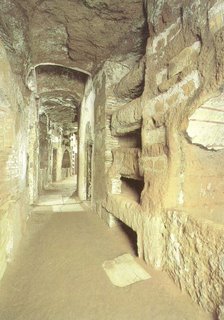Thoughts On Bones
 One of my favorite television programs is on the History International Channel, and is called "Meet the Ancestors." It is a BBC program where an archaeologist goes around Britain's many active sites and discovers information about how that person or persons lived, and then sends the bones to a forensic artist for facial reconstruction. Sometimes DNA tests are possible, and relatives in the town are located and introduced to their Neolilithic or Medieval ancestor. The show is on Wednesday evenings, from 10-11 PM.
One of my favorite television programs is on the History International Channel, and is called "Meet the Ancestors." It is a BBC program where an archaeologist goes around Britain's many active sites and discovers information about how that person or persons lived, and then sends the bones to a forensic artist for facial reconstruction. Sometimes DNA tests are possible, and relatives in the town are located and introduced to their Neolilithic or Medieval ancestor. The show is on Wednesday evenings, from 10-11 PM.The reason I mention this, is because last week I became upset over the British government's treatment of a particular set of bones. A medieval monk's tomb was discovered in someone's garden, and after everything could be found out about the person, and his face reconstructed, the bones were not put back in a Christian burial. For all I know, he's in some drawer in the British Museum.
 As Christians we should care about the "sacred dust" of our fellow believers. If pagans want to be cremated and tossed hither and yon, that's their business, but for millennia great care has been take over the bones of those who await the second coming of Christ Jesus our Lord. The bones of the first Christians were carefully buried, and the burial places of Peter and Paul are known, and are surrounded by other tombs. Now of course, God can locate and resurrect the a believer from the tiniest particle of their earthly body, but the point here is one of respect. Our earthly bodies were for a time temples of the Holy Spirit, baptized, and served as recepticles of the eucharistic meal. They deserve our respect and care. Each Easter our church holds a sunrise service in the cemetery, and I remind those present that we stand in the midst of many who will be our companions in eternity. Rabbinic tradition teaches that God himself buried Moses. We don't belong in museum drawers, or paved over by parking lots. Why do Native Americans make sure their ancestors are reburied? Their covenant of care has no expiration date, and neither should ours.
As Christians we should care about the "sacred dust" of our fellow believers. If pagans want to be cremated and tossed hither and yon, that's their business, but for millennia great care has been take over the bones of those who await the second coming of Christ Jesus our Lord. The bones of the first Christians were carefully buried, and the burial places of Peter and Paul are known, and are surrounded by other tombs. Now of course, God can locate and resurrect the a believer from the tiniest particle of their earthly body, but the point here is one of respect. Our earthly bodies were for a time temples of the Holy Spirit, baptized, and served as recepticles of the eucharistic meal. They deserve our respect and care. Each Easter our church holds a sunrise service in the cemetery, and I remind those present that we stand in the midst of many who will be our companions in eternity. Rabbinic tradition teaches that God himself buried Moses. We don't belong in museum drawers, or paved over by parking lots. Why do Native Americans make sure their ancestors are reburied? Their covenant of care has no expiration date, and neither should ours.{photo: Roman catacombs}



0 Comments:
Post a Comment
<< Home